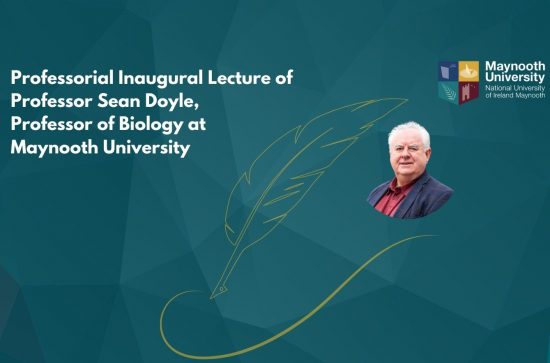
Professor Profile: Professor Seán Doyle
Appointed Full Professor in 2022, Seán Doyle is a molecular microbiologist in the Department of Biology whose career spans academic research and industry. Since joining Maynooth University in 1997, he has helped shape the BSc in Biotechnology and led research into fungal pathogens, diagnostic systems, and antimicrobial resistance.
He will deliver his inaugural professorial lecture, Converting ideas to reality: the challenge of making micro impacts, on 10 April 2025 at 3:00 pm in Renehan Hall.
Register to attend on Eventbrite
This short profile explores his career path, current research, and what continues to drive his work.
What is the focus of your research?
I work on infectious disease – mainly bacteria and fungi that cause illness in humans. I’m interested in how these pathogens survive, evolve, and interact with the body at a molecular level, including how they produce toxins and resist treatment.
How did you become interested in this area?
I came to it in a roundabout way. I studied biochemistry at UCC and went on to do a PhD, which I often describe as the key that opened the lock – it gave me access to the kind of work I really wanted to do.
After that, I moved to the UK and joined Wellcome Diagnostics, where I worked on in vitro diagnostic systems, including tests for Hepatitis C in blood donations. That was a turning point – it gave me insight into the diagnostic side of healthcare and broadened my perspective.
I came back to Ireland and spent some time in industry, but I knew I wanted to lead my own research. I was fortunate to be recruited to Maynooth in 1997 by the now Emeritus Professor Peter Whittaker.
What are some of the projects you’ve led at Maynooth?
One of the first major projects I led at Maynooth focused on Aspergillus fumigatus, a fungus that causes serious illness in people with weakened immune systems. Over time, we found that some of the molecules it produces to protect itself from toxins might help us better understand – or even address – antimicrobial resistance.
That work continues alongside bacterial-focused research. A current project, NEOSEPSIS, which I co-lead with Dr Nicola Mountford from the School of Business, looks at bacterial sepsis in newborns in Uganda – a major health challenge in low-resource settings. Nicola leads on health systems and technology adoption, while I focus on diagnostic clinical evaluations. It's a collaborative effort with partners in Uganda and here in Maynooth, including Accuplex Diagnostics and the Irish Neonatal Health Alliance, who bring a strong focus on societal impact.
How does your research influence your teaching?
I teach across undergraduate and postgraduate levels, and the research directly feeds into both. I bring it into the classroom whenever I can – that's how you make it real and relevant. I always encourage students to keep asking “why?” Why does that happen? Why does it work that way? That’s where science starts.
I still enjoy teaching as much now as I did when I started. I like seeing students go from uncertainty to confidence – in themselves and in their subject. The goal is to get them to a place where they can take what they’ve learned and contribute something meaningful.
What stands out when you reflect on your time at Maynooth so far?
I’ve had a lot of opportunity here — and I hope I’ve created opportunities for others too. That’s important. I’ve always tried to contribute, not just through my own work, but by helping to build something broader.
Over the years, I’ve been involved in building up our research infrastructure here. One of the things we’ve been able to do is to align two state-of-the-art technologies: genome engineering in fungi and protein mass spectrometry. They’re mutually useful in helping us understand how these organisms work and how they might be contributing to disease.
What advice would you give to someone starting out in your field?
Be prepared for setbacks — and be persistent. Research doesn’t always go the way you expect it to, and funding is competitive. But if you’re asking good questions and you stay focused, opportunities do come along. You need real tenacity to keep going when things don’t go to plan.
There’s a quote from Louis Pasteur that I think sums it up: chance favours the prepared mind. That’s certainly been true in my experience. You have to be ready — for the unexpected result, the funding call, for the collaboration you didn’t see coming. A lot of research is about recognising the opportunity and being in a position to follow it through.
